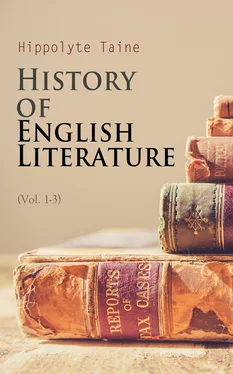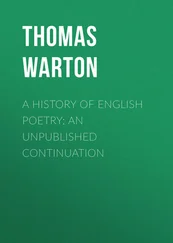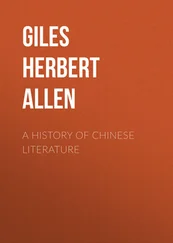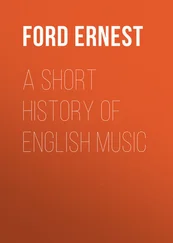[380]"Anatomy of Melancholy," 12th ed. 1821, 2 vols; Democritus to the Reader, I. 4.
[381]"Anatomy of Melancholy," I. part 2, sec. 2, Mem. 4, p. 420 et passim.
[382]"The Works of Sir Thomas Browne," ed. Wilkin, 1852, 3 vols. "Hydriotaphia," III. ch. V. 14 et passim.
[383]See Milsand, Étude sur Sir Thomas Browne, in the "Revue des Deux Mondes," 1858.
[384]Bacon's Works. Translation of the "De Augmentis Scientiarum," Book II; To the King.
[385]Ibid. Book I. The true end of learning mistaken.
[386]Especially in the Essays.
[387]See also "Novum Organum," Books I and II; the twenty-seven kinds of examples, with their metaphorical names: Instantiæ crucis, divortii januæ, Instantiæ innuentes, polychrestæ, magicæ, etc.
[388]"The Works of Francis Bacon," London, 1824, vol. VII. p. 2. "Latin Biography," by Rawley.
[389]This point is brought out by the review of Lord Macaulay. "Critical and Historical Essays," vol. III.
[390]"Novum Organum," II. 15 and 16.
[391]Ibid. I. I. 3.
[392]"Natural History," 800, 24, etc. "De Augmentis," III. 1.
CHAPTER SECOND
The Theatre
Table of Contents
We must look at this world more closely, and beneath the ideas which are developed seek for the living men; it is the theatre especially which is the original product of the English Renaissance, and it is the theatre especially which will exhibit the men of the English Renaissance. Forty poets, amongst them ten of superior rank, as well as one, the greatest of all artists who have represented the soul in words; many hundreds of pieces, and nearly fifty masterpieces; the drama extended over all the provinces of history, imagination, and fancy—expanded so as to embrace comedy, tragedy, pastoral and fanciful literature—to represent all degrees of human condition, and all the caprices of human invention—to express all the perceptible details of actual truth, and all the philosophic grandeur of general reflection; the stage disencumbered of all precept and freed from all imitation, given up and appropriated in the minutest particulars to the reigning taste and public intelligence; all this was a vast and manifold work, capable by its flexibility, its greatness, and its form, of receiving and preserving the exact imprint of the age and of the nation. [393]
SECTION I.—The Public and the Stage
Table of Contents
Let us try, then, to set before our eyes this public, this audience, and this stage—all connected with one another, as in every natural and living work; and if ever there was a living and natural work, it is here. There were already seven theatres in London, in Shakespeare's time, so brisk and universal was the taste for dramatic representations. Great and rude contrivances, awkward in their construction, barbarous in their appointments; but a fervid imagination readily supplied all that they lacked, and hardy bodies endured all inconveniences without difficulty. On a dirty site, on the banks of the Thames, rose the principal theatre, the Globe, a sort of hexagonal tower, surrounded by a muddy ditch, on which was hoisted a red flag. The common people could enter as well as the rich: there were sixpenny, twopenny, even penny seats; but they could not see it without money. If it rained, and it often rains in London, the people in the pit, butchers, mercers, bakers, sailors, apprentices, receive the streaming rain upon their heads. I suppose they did not trouble themselves about it; it was not so long since they began to pave the streets of London; and when men, like these, have had experience of sewers and puddles, they are not afraid of catching cold. While waiting for the piece, they amuse themselves after their fashion, drink beer, crack nuts, eat fruit, howl, and now and then resort to their lists; they have been known to fall upon the actors, and turn the theatre upside down. At other times they were dissatisfied and went to the tavern to give the poet a hiding, or toss him in a blanket; they were coarse fellows, and there was no month when the cry of "Clubs" did not call them out of their shops to exercise their brawny arms. When the beer took effect, there was a great upturned barrel in the pit, a peculiar receptacle for general use. The smell rises, and then comes the cry, "Burn the juniper!" They burn some in a plate on the stage, and the heavy smoke fills the air. Certainly the folk there assembled could scarcely get disgusted at anything, and cannot have had sensitive noses. In the time of Rabelais there was not much cleanliness to speak of. Remember that they were hardly out of the Middle Ages and that in the Middle Ages man lived on a dunghill.
Above them, on the stage, were the spectators able to pay a shilling, the elegant people, the gentlefolk. These were sheltered from the rain, and if they chose to pay an extra shilling, could have a stool. To this were reduced the prerogatives of rank and the devices of comfort: it often happened that there were not stools enough; then they lie down on the ground: this was not a time to be dainty. They play cards, smoke, insult the pit, who gave it them back without stinting, and throw apples at them into the bargain. They also gesticulate, swear in Italian, French, English; [394]crack aloud jokes in dainty, composite, high-colored words: in short, they have the energetic, original, gay manners of artists, the same humor, the same absence of constraint, and, to complete the resemblance, the same desire to make themselves singular, the same imaginative cravings, the same absurd and picturesque devices, beards cut to a point, into the shape of a fan, a spade, the letter T, gaudy and expensive dresses, copied from five or six neighboring nations, embroidered, laced with gold, motley, continually heightened in effect or changed for others: there was, as it were, a carnival in their brains as well as on their backs.
With such spectators illusions could be produced without much trouble: there were no preparations or perspectives; few or no movable scenes: their imaginations took all this upon them. A scroll in big letters announced to the public that they were in London or Constantinople; and that was enough to carry the public to the desired place. There was no trouble about probability. Sir Philip Sidney writes:
"You shall have Asia of the one side, and Africke of the other, and so many other under-kingdomes, that the Plaier when hee comes in, must ever begin with telling where hee is, or else the tale will not be conceived. Now shall you have three Ladies walke to gather flowers, and then wee must beleeve the stage to be a garden. By and by wee heare newes of shipwracke in the same place, then wee are to blame if we accept it not for a rocke;... while in the meane time two armies flie in, represented with foure swordes and bucklers, and then what hard heart will not receive it for a pitched field? Now of time they are much more liberall. For ordinary it is, that two young Princes fall in love, after many traverses, shee is got with childe, delivered of a faire boy, hee is lost, groweth a man, falleth in love, and is readie to get another childe; and all this in two hours space." [395]
Doubtless these enormities were somewhat reduced under Shakespeare; with a few hangings, crude representations of animals, towers, forests, they assisted somewhat the public imagination. But after all, in Shakespeare's plays, as in all others, the imagination from within is chiefly drawn upon for the machinery; it must lend itself to all, substitute all, accept for a queen a young man who has just been shaved, endure in one act ten changes of place, leap suddenly over twenty years or five hundred miles, [396]take half a dozen supernumeraries for forty thousand men, and to have represented by the rolling of the drums all the battles of Caesar, Henry V, Coriolanus, Richard III. And imagination, being so overflowing and so young, accepts all this. Recall your own youth; for my part, the deepest emotions I have ever felt at a theatre were given to me by a strolling bevy of four young girls, playing comedy and tragedy on a stage in a coffee-house; true, I was eleven years old. So in this theatre, at this moment, their souls were fresh, as ready to feel everything as the poet was to dare everything.
Читать дальше












